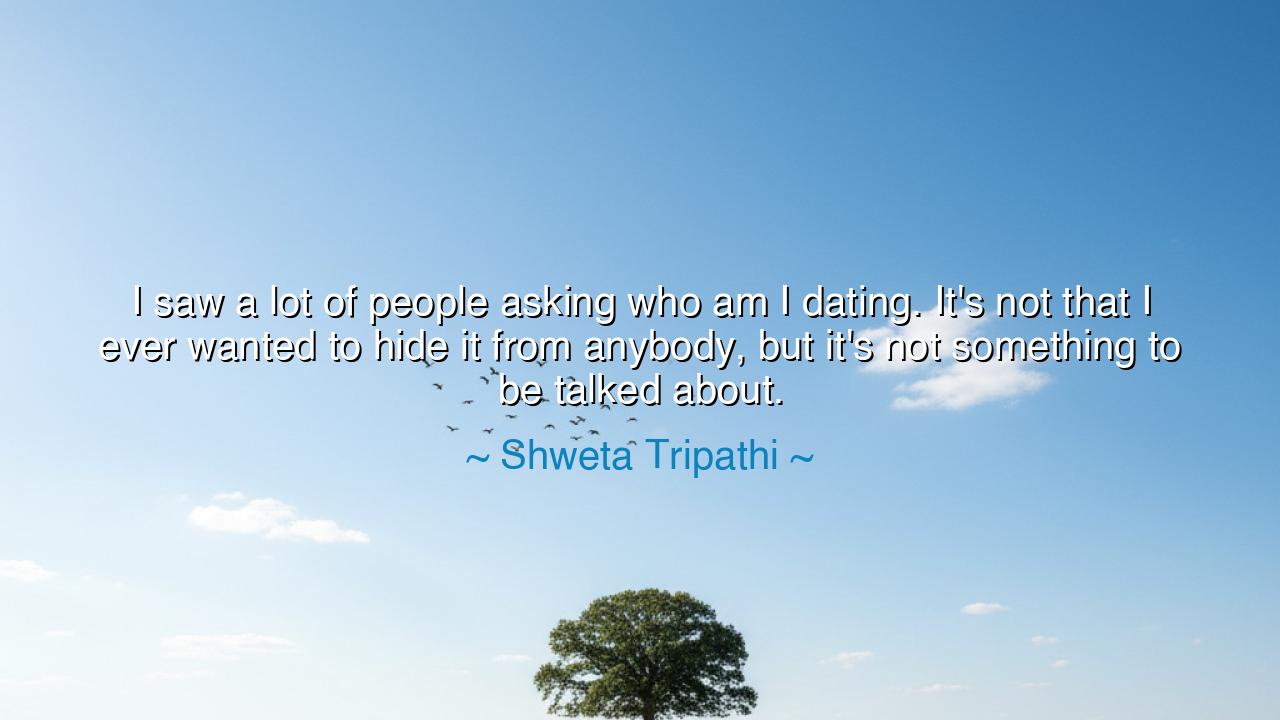
I saw a lot of people asking who am I dating. It's not that I
I saw a lot of people asking who am I dating. It's not that I ever wanted to hide it from anybody, but it's not something to be talked about.






Hear the words of Shweta Tripathi, who said: “I saw a lot of people asking who am I dating. It’s not that I ever wanted to hide it from anybody, but it’s not something to be talked about.” Though gentle in tone, these words are filled with quiet dignity and timeless wisdom. They remind us that privacy, in an age of noise, is not secrecy—it is sanctity. In her statement lies the truth of one who lives in the public eye yet understands that not all things belong to the crowd. She draws a sacred boundary around the private spaces of the heart, affirming that the most beautiful parts of life need not be displayed to prove they exist.
The origin of this quote lies in the life of Shweta Tripathi, an actress known not only for her craft but for her authenticity. Surrounded by the relentless curiosity of fame, she found herself often questioned about her relationships, as though love itself were a public performance. Yet her words carry no bitterness—only resolve. She acknowledges the curiosity of others, even forgives it, but claims for herself the right to silence. For what she defends is more than privacy; it is ownership of one’s own narrative, the right to decide which parts of the soul the world may see and which shall remain sacred within.
In the days of the ancients, such wisdom was prized. The philosopher Epictetus taught that serenity lies not in controlling what others say, but in guarding what we choose to reveal. “If you would be free,” he said, “do not be enslaved to the gaze of others.” Shweta’s words echo that Stoic truth. She stands not in defiance, but in grace—reminding us that to keep something for oneself is not to withhold love, but to honor it. For love, once exposed to the wind of public opinion, risks being reduced from truth to spectacle. It becomes performance instead of presence. Thus, the wise protect what is real from what is ravenous.
Her words also reveal a deeper reflection on the world we inhabit—a world where people mistake transparency for authenticity. The constant sharing of private joys and heartbreaks has blurred the line between confession and consumption. But Shweta’s restraint teaches a higher form of honesty—the kind that is not performed for validation, but lived quietly, sincerely, and fully. To speak less is not to feel less; it is to value experience above exhibition. Like the roots of a tree, the deepest loves and convictions are often unseen, yet they sustain the life above.
Consider the tale of Antony and Cleopatra, whose love was as grand as empire and as public as war. Their passion, laid bare before nations, burned with glory but perished with the same fire. Theirs was a love the world demanded to witness—and thus, the world devoured it. Contrast this with the story of Abelard and Héloïse, whose letters of devotion were written in secret, hidden from the gaze of their time. Though centuries have passed, their love endures in those words—private truths that became eternal only because they were first protected. The lesson is clear: what is sacred must first be guarded, if it is to endure.
Shweta Tripathi’s refusal to make her private life a topic of spectacle is, therefore, an act of quiet rebellion against the world’s hunger for exposure. She reminds us that not everything precious needs to be explained, and not every truth must be shared to be real. Her silence is not emptiness—it is strength wrapped in humility. It says, “I live my life for myself, not for your consumption.” This is the same courage that allows an artist to create from authenticity rather than approval, and a soul to love without seeking applause.
So, children of the modern age, take this lesson into your hearts: in a world that thrives on spectacle, guard your sacred spaces. Speak when your words will heal, but keep silence when your heart demands peace. Not every joy must be posted, not every sorrow must be shared. Learn to let some parts of your life exist only in the intimacy of truth, untouched by the world’s commentary. For what is hidden in love is not lost—it is protected.
And thus, as Shweta Tripathi teaches through her quiet strength, the art of living well lies not in how loudly we are seen, but in how wisely we are unseen. Keep what is precious close, for in silence, true love breathes freely—unmeasured, unjudged, and undiminished by the eyes of others.






AAdministratorAdministrator
Welcome, honored guests. Please leave a comment, we will respond soon